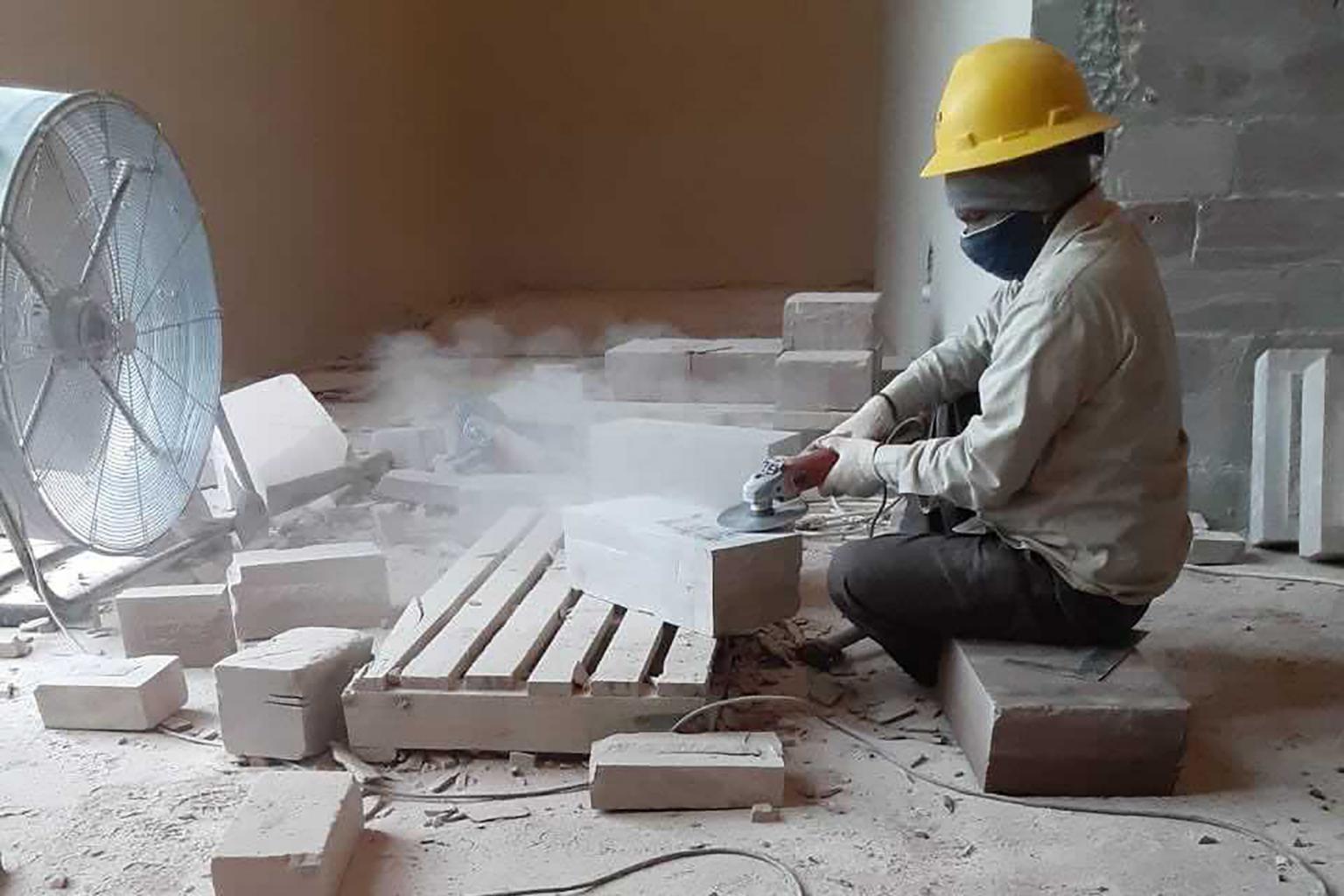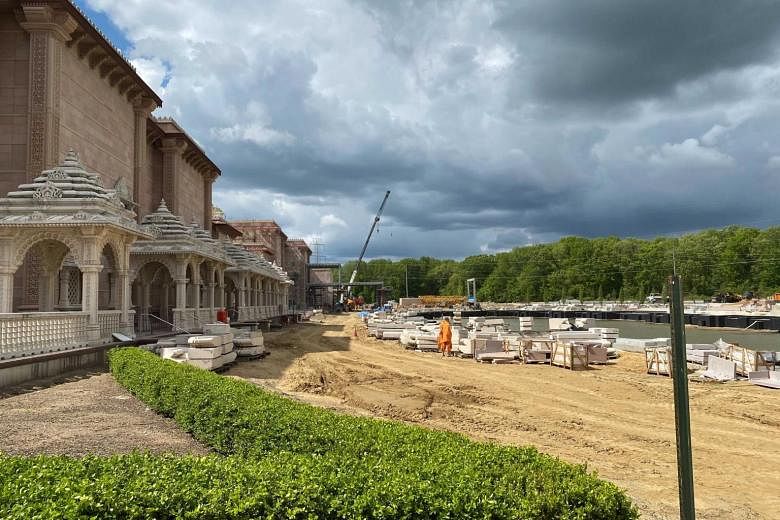NEW YORK (NYTIMES) - Federal law enforcement agents descended on a massive temple in New Jersey on Tuesday (May 11) after workers accused a prominent Hindu sect of luring them from India, confining them to the temple grounds and paying them the equivalent of about US$1 (S$1.33) an hour to perform gruelling labour in near servitude.
In a lawsuit filed on Tuesday, lawyers for the labourers said Bochasanwasi Akshar Purushottam Swaminarayan Sanstha, a Hindu sect known as BAPS that has close ties to India's ruling party and has built temples around the world, had exploited possibly hundreds of low-caste men in the years-long construction project.
A spokeswoman for the FBI confirmed agents had been on the grounds of the temple in rural Robbinsville, New Jersey, but would not comment further. The action is said to be connected to the claims of labour and immigration law violations, according to several people familiar with the matter. A spokesman for the Department of Homeland Security declined to comment.
The workers, who lived in trailers hidden from view, had been promised jobs helping to build the temple with standard work hours and ample time off, according to the lawsuit, a wage claim filed in US District Court in New Jersey. The majority are Dalit, the lowest rung in India's caste system.
They were brought to the United States on religious visas, or R-1 visas - temporary visas used for clergy and lay religious workers such as missionaries - and presented to the US government as volunteers, according to the claim.
They were asked to sign several documents, often in English, and instructed to tell US embassy staffers that they were skilled carvers or decorative painters, the complaint said.
Lawyers for the men, however, said they did manual labour on the site, working nearly 13 hours a day lifting large stones, operating cranes and other heavy machinery, building roads and storm sewers, digging ditches and shoveling snow, all for the equivalent of about US$450 per month.
"I respectfully disagree with the wage claim," Kanu Patel, chief executive of BAPS, told The New York Times, while noting he was not in charge of day-to-day operations at the site.
Lenin Joshi, a spokesman for BAPS, also disputed the accusations, saying the men did complicated work connecting stones that had been hand-carved in India.
"They have to be fit together like a jigsaw puzzle. In that process, we need specialised artisans," Joshi said, saying this work qualified the men for the visas.
"We are naturally shaken by this turn of events and are sure that once the full facts come out, we will be able to provide answers and show that these accusations and allegations are without merit," Joshi said.
By midday Tuesday, federal agents had loaded about 90 workers onto buses to be taken off the site, according to a person familiar with the matter.
The lawsuit said the men's passports had been confiscated, and they were confined to the fenced-in and guarded site, where they were forbidden from talking to visitors. They subsisted on a bland diet of lentils and potatoes, and their pay was docked for minor violations, such as being seen without a helmet, according to the claim.
"They thought they would have a good job and see America. They didn't think they would be treated like animals, or like machines that aren't going to get sick," said Swati Sawant, an immigration lawyer in New Jersey who is also Dalit and said she first learned of the men's plight last year.
She said she secretly organised the temple workers and arranged legal teams to pursue both wage and immigration claims.

BAPS describes itself as "a spiritual, volunteer-driven organization dedicated to improving society through individual growth by fostering the Hindu ideals of faith, unity and selfless service."
Over the years, the organisation has grown into a global enterprise made up of both for-profit and nonprofit entities. It builds temples around the world that draw visitors with awe-inspiring white stone spires, intricate carvings, gurgling fountains and wandering peacocks.
The New Jersey temple, or mandir, is itself a multimillion-dollar operation, public records show. It opened in 2014 but is still under construction as BAPS has tried to fulfill its aim of building the largest Hindu temple in the country.
Located near Princeton, the temple draws followers from across the region. With nearly 400,000 Indian-born residents, New Jersey has one of the largest Indian immigrant populations in the country.
The organisation has strong ties with Narendra Modi, India's prime minister, and his ruling Bharatiya Janata Party. Modi has said that Pramukh Swami Maharaj, the spiritual head who built BAPS into the largest Hindu sect in the United States before dying in 2016, was his mentor. Modi gave a eulogy at his funeral and laid the foundation stone for a temple that BAPS is building in Abu Dhabi, United Arab Emirates.
The organisation also pledged the equivalent of about US$290,000 to Modi's most important election promise: building a temple in the city of Ayodhya, where a mosque had stood before Hindu devotees destroyed it in 1992. The destruction of the Babri Mosque set off waves of sectarian violence, and the construction of the temple in Ayodhya is a significant step in the quest by Modi and his party to shift India from its secular foundations toward a Hindu identity.
Along with its temples, BAPS publicises its good works. In the pandemic, the group has donated masks to hospitals in Los Angeles and has flown oxygen to India, which has been recently engulfed in a devastating Covid-19 outbreak.
The New Jersey temple is meant to be the crown jewel in BAPS' growing number of American places of worship.
The complaint named six men who said they were among more than 200 Indian nationals who were recruited to come to the United States starting about 2018 and were made to work gruelling hours under often dangerous conditions on the New Jersey site.
One labourer died last fall, prompting a backlash among the workers, according to the complaint.
Mukesh Kumar, a 37-year-old worker who has since returned to India, contacted Sawant, the immigration lawyer, who began investigating. Kumar, who is named in the federal lawsuit, said in an interview with The New York Times that BAPS' response to the death of his co-worker prompted him and others to come forward.
"We said, 'We don't want to die like that,'" he said.
Daniel Werner, a lawyer in the wage claim suit, said he believed this could be the first forced-labour case of its scale in the United States since dozens of Thai garment workers were discovered labouring in horrible conditions in El Monte, California, in 1995 - a landmark case that helped lead to the creation of the federal Trafficking Victims Protection Act.
The New Jersey case, Werner said, could be compared to instances of severe worker exploitation seen overseas. "There are parallels in other places. But what's striking is that this is in the United States," he said.

